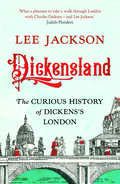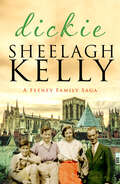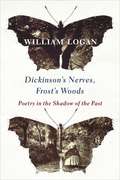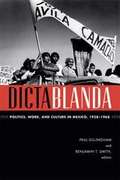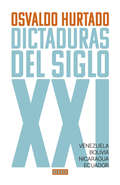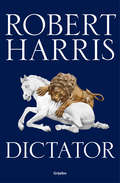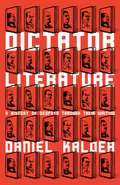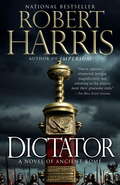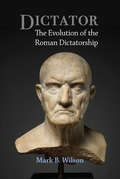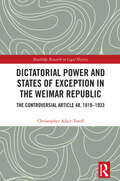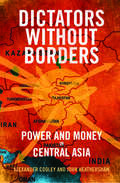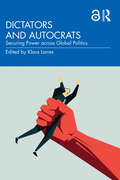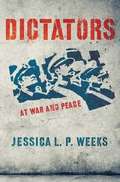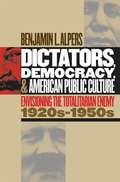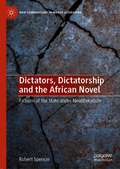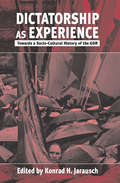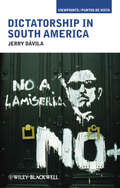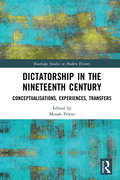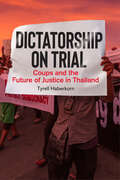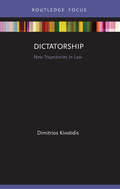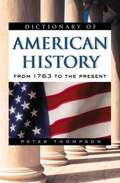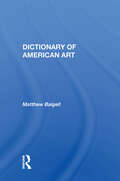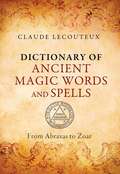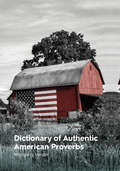- Table View
- List View
Dickensland: The Curious History of Dickens's London
by Lee JacksonThe intriguing history of Dickens’s London, showing how tourists have reimagined and reinvented the Dickensian metropolis for more than 150 years “Jackson paints a vivid and detailed picture of the city as it was. . . . Dickens, who was no stranger to the instructive and comedic joys of pedantry, would surely have approved.”—Ann Alicia Garza, Times Literary Supplement Tourists have sought out the landmarks, streets, and alleys of Charles Dickens’s London ever since the death of the world-renowned author. Late Victorians and Edwardians were obsessed with tracking down the locations—dubbed “Dickensland”—that famously featured in his novels. But his fans were faced with a city that was undergoing rapid redevelopment, where literary shrines were far from sacred. Over the following century, sites connected with Dickens were demolished, relocated, and reimagined. Lee Jackson traces the fascinating history of Dickensian tourism, exploring both real Victorian London and a fictional city shaped by fandom, tourism, and heritage entrepreneurs. Beginning with the late nineteenth century, Jackson investigates key sites of literary pilgrimage and their relationship with Dickens and his work, revealing hidden, reinvented, and even faked locations. From vanishing coaching inns to submerged riverside stairs, hidden burial grounds to apocryphal shops, Dickensland charts the curious history of an imaginary world.
Dickie (The Feeney Family Sagas)
by Sheelagh KellyFrom an author praised for her &“genuinely perceptive portrayals of human relationships,&” a historical saga about a son&’s return from America to England (Irish Independent).Richard Feeney&’s family believed him dead. Instead, in 1874, Dickie secretly fled to America, where he prospered for twenty-six years. But now he&’s back. Recriminations are soon forgotten as the family reunites. But the past has a way of catching up with you, and of catching you out. Dickie has left a trail of chaos, and his long-suffering wife and family are burdened by the consequences. When the Yorkshire Insurance Company learn that Dickie has resurfaced, he must face trial and possible imprisonment. Meanwhile, the police reopen their files on an unsolved double murder . . . The final instalment in the unforgettable Feeney Family sagas. From the author of A Long Way from Heaven, this is an enthralling read for fans of Anna Jacobs and Kitty Neale. Praise for the writing of Sheelagh Kelly: &“The tough, sparky characters of Catherine Cookson, and the same sharp sense of destiny, place and time.&” —Reay Tannahill, author of Fatal Majesty and Sex in History &“Sheelagh Kelly surely can write.&” —Sunderland Echo
Dickinson's Nerves, Frost's Woods: Poetry in the Shadow of the Past
by William LoganIn Dickinson’s Nerves, Frost’s Woods, William Logan, the noted and often controversial critic of contemporary poetry, returns to some of the greatest poems in English literature. He reveals what we may not have seen before and what his critical eye can do with what he loves. In essays that pair different poems—“Ozymandias,” “On First Looking Into Chapman’s Homer,” “In a Station of the Metro,” “The Red Wheelbarrow,” “After great pain, a formal feeling comes,” and “Stopping by Woods on a Snowy Evening,” among others—Logan reconciles history and poetry to provide new ways of reading poets ranging from Shakespeare and Shelley to Lowell and Heaney.In these striking essays, Logan presents the poetry of the past through the lens of the past, attempting to bring poems back to the world in which they were made. Logan’s criticism is informed by the material culture of that world, whether postal deliveries in Regency London, the Métro lighting in 1911 Paris, or the wheelbarrows used in 1923. Deeper knowledge of the poet’s daily existence lets us read old poems afresh, providing a new way of understanding poems now encrusted with commentary. Logan shows that criticism cannot just root blindly among the words of the poem but must live partly in a lost world, in the shadow of the poet’s life and the shadow of the age.
Dictablanda: Politics, Work, and Culture in Mexico, 1938–1968
by Benjamin Smith Paul GillinghamIn 1910 Mexicans rebelled against an imperfect dictatorship; after 1940 they ended up with what some called the perfect dictatorship. A single party ruled Mexico for over seventy years, holding elections and talking about revolution while overseeing one of the world's most inequitable economies. The contributors to this groundbreaking collection revise earlier interpretations, arguing that state power was not based exclusively on hegemony, corporatism, or violence. Force was real, but it was also exercised by the ruled. It went hand-in-hand with consent, produced by resource regulation, political pragmatism, local autonomies and a popular veto. The result was a dictablanda: a soft authoritarian regime.This deliberately heterodox volume brings together social historians, anthropologists, sociologists, and political scientists to offer a radical new understanding of the emergence and persistence of the modern Mexican state. It also proposes bold, multidisciplinary approaches to critical problems in contemporary politics. With its blend of contested elections, authoritarianism, and resistance, Mexico foreshadowed the hybrid regimes that have spread across much of the globe. Dictablanda suggests how they may endure.Contributors. Roberto Blancarte, Christopher R. Boyer, Guillermo de la Peña, María Teresa Fernández Aceves, Paul Gillingham, Rogelio Hernández Rodríguez, Alan Knight, Gladys McCormick, Tanalís Padilla, Wil G. Pansters, Andrew Paxman, Jaime Pensado, Pablo Piccato, Thomas Rath, Jeffrey W. Rubin, Benjamin T. Smith, Michael Snodgrass
Dictaduras del siglo XXI
by Osvaldo HurtadoEstudio del auge y caída del socialismo del siglo XXI, que descubre el fenómeno de los nuevos autoritarismos. Desde su irrupción en la vida política suramericana, el socialismo del siglo XXI fue inseparable de la figura de Hugo Chávez. Carisma, autenticidad, independencia, la promesa de derrotar la desigualdad, fueron algunos de sus rasgos iniciales y en poco tiempo ganó la simpatía de una región que, con la entrada al nuevo milenio, preparaba su vuelta a la izquierda. Varios partidos adhirieron al modelo y caudillos elegidos por mayorías populares llegaron al poder en países como Ecuador, Bolivia y Nicaragua. Los hechos, sin embargo, se han encargado de descubrir la otra cara de esta historia. En Dictaduras del siglo XXI, el expresidente ecuatoriano e historiador Osvaldo Hurtado, presenta el proceso político por el que un sistema democrático se convierte en dictatorial y en el que presidentes constitucionales se transforman en caudillos autocráticos. En esta nueva edición, Dictaduras del siglo XXI amplía su escala de análisis y al caso de Rafael Correa se suman los de Chávez-Maduro, Evo Morales y Daniel Ortega. Un elocuente y lúcido estudio del auge y caída de un periodo político que descubre los nuevos autoritarismos.
Dictator (Trilogía de Cicerón #3)
by Robert HarrisDictator, el cierre de la soberbia «Trilogía de Cicerón» de Robert Harris, una maestro de la novela histórica a la altura de Robert Graves, Mary Renault y Marguerite Yourcenar, nos sumerge en los últimos años de la vida de Cicerón y de la República romana. Roma, siglo I a.C.Un hombre. Unos ideales. Y el fin de una época. Hubo un tiempo en que Marco Tulio Cicerón tenía a Julio César en su mano; de haberla cerrado, lo habría destrozado. La fortuna, sin embargo, les ha llevado en direcciones opuestas: mientras su mayor enemigo marcha hacia el norte para tomar el mando de la Galia, Cicerón se ve obligado a huir de Roma para escapar de sus enemigos. Exiliado, apartado de su esposa e hijos, su vida siempre en peligro, al legendario orador le atormenta ser consciente de que ha sacrificado el poder en aras de sus principios. Su regreso exigirá astucia, destreza y coraje, ydurante un tiempo será una vez más el senador más importante de Roma. Pero ningún hombre de estado, por inteligente que sea, está a salvo de la ambición y la corrupción de quienes le rodean. Dictator, la deslumbrante conclusión de la trilogía de Cicerón, fue elegido uno de los mejores libros del año por The Guardian, The Herald, The Sunday Times y The Spectator. Una magnífica novela histórica que nos descubre a un hombre brillante e imperfecto, temeroso y valiente, protagonista de uno de los momentos más convulsos de la Roma antigua: el fin de la República. Reseñas:«Esta trilogía merece los mayores elogios que se puedan conceder a la novela histórica.»The Times «Excepcional. Confirma a Robert Harris como un maestro de la novela histórica además del thriller.»Daily Mail «Un extraordinario logro literario y una trilogía que perdurará junto a las obras de Robert Graves y de Mary Renault como una imperecedera e imaginativa visión del mundo antiguo.»The Guardian «Robert Harris es un narrador incomparable.»The Daily Express «Le imprime un aire de thriller, de un Juego de tronos real. Aunque la profundidad y la fidelidad a la historia sitúan a Harris en la misma liga que Marguerite Yourcenar.»Vulture «Imperium y Conspiración, las predecesoras de esta novela, hacían emocionante la antigua Roma. Dictator va más allá, ofreciendo también sabiduría y consuelo.»The Washington Post «Con Dictator Robert Harris cierra su "Trilogía de Cicerón" de una manera gloriosa y enormemente conmovedora. Los tres libros son, sin duda, de lo mejor que se ha hecho en novela histórica ambientada en el mundo antiguo. Una historia dramática y maravillosa, y maravillosamente contada.»The Scotsman «Un relato magistral sobre intrigas políticas. Una novela absorbente y fascinante.»Financial Times «La descripción que Harris hace del personaje de Julio César impresiona, pero es el retrato de su ambivalente héroe lo que da una fuerza extraordinaria a Dictator.»The Sunday Times
Dictator Literature: A History of Bad Books by Terrible People
by Daniel KalderA Book of the Year for The Times and the Sunday Times &‘The writer is the engineer of the human soul,&’ claimed Stalin. Although one wonders how many found nourishment in Turkmenbashi&’s Book of the Soul (once required reading for driving tests in Turkmenistan), not to mention Stalin&’s own poetry. Certainly, to be considered great, a dictator must write, and write a lot. Mao had his Little Red Book, Mussolini and Saddam Hussein their romance novels, Kim Jong-il his treatise on the art of film, Hitler his hate-filled tracts. What do these texts reveal about their authors, the worst people imaginable? And how did they shape twentieth-century history? To find out, Daniel Kalder read them all – the badly written and the astonishingly badly written – so that you don&’t have to. This is the untold history of books so terrible they should have been crimes.
Dictator: A novel (Cicero Trilogy Ser. #3)
by Robert HarrisImperium . . . Conspirata . . . and now Dictator--the long-awaited final volume of Robert Harris's magnificent Ancient Rome Trilogy At the age of forty-eight, Cicero--the greatest orator of his time--is in exile, separated from his wife and children, tormented by his sense of failure, his great power sacrificed on the altar of his principles. And yet, in the words of one of his most famous aphorisms, "While there is life, there is hope."By promising to support Caesar--his political enemy--he is granted return to Rome. There, he fights his way back to prominence: first in the law courts, then in the Senate, and finally by the power of his pen, until at last, for one brief and glorious period, he is again the preeminent statesman in the city. Even so, no public figure, however brilliant and cunning, is completely safeguarded against the unscrupulous ambition and corruption of others. Riveting and tumultuous, Dictator encompasses some of the most epic events in ancient history--the collapse of the Roman Republic and the subsequent civil war, the murder of Pompey, the assassination of Julius Caesar. But the central problem it presents is a timeless one: how to keep political freedom unsullied by personal ambition, vested interests, and the erosive effects of ceaseless, senseless foreign wars. In Robert Harris's indelible portrait, Cicero attempts to answer this question with both his thoughts and his deeds, becoming a hero--brilliant, flawed, frequently fearful yet ultimately brave--both for his own time and for ours.From the Hardcover edition.
Dictator: The Evolution of the Roman Dictatorship
by Mark WilsonRoman consuls were routinely trained by background and experience to handle the usual problems of a twelve-month turn in office. But what if a crisis arose that wasn’t best met by whoever happened to be in office that year? The Romans had a mechanism for that: the dictatorship, an alternative emergency executive post that granted total, unanswerable power to that man who was best suited to resolve the crisis and then stand down, restoring normality. This office was so useful and effective that it was invoked at least 85 times across three centuries against every kind of serious problem, from conspiracies and insurgencies to the repelling of invaders to propitiation of the gods. In Dictator: The Evolution of the Roman Dictatorship, Mark B. Wilson makes the first detailed and comprehensive examination of the role and evolution of the dictatorship as an integral element of the Roman Republic. Each stage of a dictatorship—need, call, choice, invocation, mandate, imperium, answerability, colleague, and renunciation—is explored, with examples and case studies illustrating the dictators’ rigorous adherence to a set of core principles, or, in rare cases of deviation, showing how exceptions tended to demonstrate the rule as vividly as instances. Wilson also charts the flexibility of the dictatorship as it adapted to the needs of the Republic, reshaping its role in relation to the consuls, the senate, and the people. The routine use of the dictatorship is only part of the story. The abandonment and disuse of the dictatorship for 120 years, its revival under Sulla, and its appropriation and transformation under Caesar are all examined in detail, with attention paid to what the dictatorship meant to the Romans of the late Republic, alternative means of crisis resolution in contrast with the dictatorship, and the groundwork laid in those last two centuries for that which was to come. Dictator provides a new basis for discussion and debate relating to the Roman dictatorship, Roman crisis management, and the systems and institutions of the Roman Republic.
Dictatorial Power and States of Exception in the Weimar Republic: The Controversial Article 48, 1919-1933 (Routledge Research in Legal History)
by Christopher Adair-ToteffThis book is an account of the tension between the need for order and the desire for freedom during the tense years of the Weimar Republic. It explains how various groups interpreted Article 48 of the Weimar Constitution and utilized it to reinstate peace and tranquility. While Article 48 is usually associated with the so-called Preußenschlag—the taking over of the Prussian government by the order of Reich Chancellor Kurt von Papen—it had been introduced as a necessity during earlier “states of emergency.”This investigation delves into the relevant works by many of the leading constitutional scholars in Germany. This list includes Hugo Preuss, Carl Schmitt, Hans Kelsen, Gerhard Anschütz, Richard Thoma, Erwin Jacobi, Hans Nawiasky, and Richard Grau. This book is a clearly written and detailed account of the history surrounding the debate about the appropriate emergency measures to be taken under Article 48. The work is important for its historical interest, and also because the conflict between authority and freedom has continuing relevance.The book will be a valuable resource for researchers and academics working in the areas of Legal History, Legal Philosophy, Legal Theory, Constitutional History, and German Studies.
Dictators Without Borders: Power and Money in Central Asia
by Alexander A. Cooley John HeathershawA penetrating look into the unrecognized and unregulated links between autocratic regimes in Central Asia and centers of power and wealth throughout the West Weak, corrupt, and politically unstable, the former Soviet republics of Kazakhstan, Kyrgyzstan, Tajikistan, and Uzbekistan are dismissed as isolated and irrelevant to the outside world. But are they? This hard-hitting book argues that Central Asia is in reality a globalization leader with extensive involvement in economics, politics and security dynamics beyond its borders. Yet Central Asia's international activities are mostly hidden from view, with disturbing implications for world security. Based on years of research and involvement in the region, Alexander Cooley and John Heathershaw reveal how business networks, elite bank accounts, overseas courts, third-party brokers, and Western lawyers connect Central Asia's supposedly isolated leaders with global power centers. The authors also uncover widespread Western participation in money laundering, bribery, foreign lobbying by autocratic governments, and the exploiting of legal loopholes within Central Asia. Riveting and important, this book exposes the global connections of a troubled region that must no longer be ignored.
Dictators and Autocrats: Securing Power across Global Politics
by Klaus LarresIn order to truly understand the emergence, endurance, and legacy of autocracy, this volume of engaging essays explores how autocratic power is acquired, exercised, and transferred or abruptly ended through the careers and politics of influential figures in more than 20 countries and six regions. The book looks at both traditional "hard" dictators, such as Hitler, Stalin, and Mao, and more modern "soft" or populist autocrats, who are in the process of transforming once fully democratic countries into autocratic states, including Recep Tayyip Erdoğan in Turkey, Brazilian leader Jair Bolsonaro, Rodrigo Duterte in the Philippines, Narendra Modi in India, and Viktor Orbán in Hungary. The authors touch on a wide range of autocratic and dictatorial figures in the past and present, including present-day autocrats, such as Vladimir Putin and Xi Jinping, military leaders, and democratic leaders with authoritarian aspirations. They analyze the transition of selected autocrats from democratic or benign semi-democratic systems to harsher forms of autocracy, with either quite disastrous or more successful outcomes. An ideal reader for students and scholars, as well as the general public, interested in international affairs, leadership studies, contemporary history and politics, global studies, security studies, economics, psychology, and behavioral studies.
Dictators and Their Secret Police: (Cambridge Studies in Contentious Politics)
by Sheena Chestnut GreitensHow do dictators stay in power? When, and how, do they use repression to do so? Dictators and their Secret Police explores the role of the coercive apparatus under authoritarian rule in Asia - how these secret organizations originated, how they operated, and how their violence affected ordinary citizens. Greitens argues that autocrats face a coercive dilemma: whether to create internal security forces designed to manage popular mobilization, or defend against potential coup. Violence against civilians, she suggests, is a byproduct of their attempt to resolve this dilemma. Drawing on a wealth of new historical evidence, this book challenges conventional wisdom on dictatorship: what autocrats are threatened by, how they respond, and how this affects the lives and security of the millions under their rule. It offers an unprecedented view into the use of surveillance, coercion, and violence, and sheds new light on the institutional and social foundations of authoritarian power.
Dictators at War and Peace
by Jessica L. WeeksWhy do some autocratic leaders pursue aggressive or expansionist foreign policies, while others are much more cautious in their use of military force? The first book to focus systematically on the foreign policy of different types of authoritarian regimes, Dictators at War and Peace breaks new ground in our understanding of the international behavior of dictators. Jessica L. P. Weeks explains why certain kinds of regimes are less likely to resort to war than others, why some are more likely to win the wars they start, and why some authoritarian leaders face domestic punishment for foreign policy failures whereas others can weather all but the most serious military defeat. Using novel cross-national data, Weeks looks at various nondemocratic regimes, including those of Saddam Hussein and Joseph Stalin; the Argentine junta at the time of the Falklands War, the military government in Japan before and during World War II, and the North Vietnamese communist regime. She finds that the differences in the conflict behavior of distinct kinds of autocracies are as great as those between democracies and dictatorships. Indeed, some types of autocracies are no more belligerent or reckless than democracies, casting doubt on the common view that democracies are more selective about war than autocracies.
Dictators, Democracy, and American Public Culture
by Benjamin L. AlpersFocusing on portrayals of Mussolini's Italy, Hitler's Germany, and Stalin's Russia in U.S. films, magazine and newspaper articles, books, plays, speeches, and other texts, Benjamin Alpers traces changing American understandings of dictatorship from the late 1920s through the early years of the Cold War.During the early 1930s, most Americans' conception of dictatorship focused on the dictator. Whether viewed as heroic or horrific, the dictator was represented as a figure of great, masculine power and effectiveness. As the Great Depression gripped the United States, a few people--including conservative members of the press and some Hollywood filmmakers--even dared to suggest that dictatorship might be the answer to America's social problems. In the late 1930s, American explanations of dictatorship shifted focus from individual leaders to the movements that empowered them. Totalitarianism became the image against which a view of democracy emphasizing tolerance and pluralism and disparaging mass movements developed. First used to describe dictatorships of both right and left, the term "totalitarianism" fell out of use upon the U.S. entry into World War II. With the war's end and the collapse of the U.S.-Soviet alliance, however, concerns about totalitarianism lay the foundation for the emerging Cold War.
Dictators, Dictatorship and the African Novel: Fictions of the State under Neoliberalism (New Comparisons in World Literature)
by Robert SpencerThis book examines the representation of dictators and dictatorships in African fiction. It examines how the texts clarify the origins of postcolonial dictatorships and explore the shape of the democratic-egalitarian alternatives. The first chapter explains the ‘neoliberal’ period after the 1970s as an effective ‘recolonization’ of Africa by Western states and international financial institutions. Dictatorship is theorised as a form of concentrated economic and political power that facilitates Africa’s continued dependency in the context of world capitalism. The deepest aspiration of anti-colonial revolution remains the democratization of these authoritarian states inherited from the colonial period. This book discusses four novels by Ngũgĩ wa Thiong’o, Ahmadou Kourouma, Chinua Achebe and Chimamanda Ngozi Adichie in order to reveal how their themes and forms dramatize this unfinished struggle between dictatorship and radical democracy.
Dictatorship As Experience
by Konrad H. JarauschA decade after the collapse of communism, this volume presents a historical reflection on the perplexing nature of the East German dictatorship. In contrast to most political rhetoric, it seeks to establish a middle ground between totalitarianism theory, stressing the repressive features of the SED-regime, and apologetics of the socialist experiment, emphasizing the normality of daily lives. The book transcends the polarization of public debate by stressing the tensions and contradictions within the East German system that combined both aspects by using dictatorial means to achieve its emancipatory aims. By analyzing a range of political, social, cultural, and chronological topics, the contributors sketch a differentiated picture of the GDR which emphasizes both its repressive and its welfare features. The sixteen original essays, especially written for this volume by historians from both east and west Germany, represent the cutting edge of current research and suggest new theoretical perspectives. They explore political, social, and cultural mechanisms of control as well as analyze their limits and discuss the mixture of dynamism and stagnation that was typical of the GDR.
Dictatorship in South America
by Jerry DávilaDictatorship in South America explores the experiences of Brazilian, Argentine and Chilean experience under military rule.Presents a single-volume thematic study that explores experiences with dictatorship as well as their social and historical contexts in Latin AmericaExamines at the ideological and economic crossroads that brought Argentina, Brazil and Chile under the thrall of military dictatorshipDraws on recent historiographical currents from Latin America to read these regimes as radically ideological and inherently unstableMakes a close reading of the economic trajectory from dependency to development and democratization and neoliberal reform in language that is accessible to general readersOffers a lively and readable narrative that brings popular perspectives to bear on national historiesSelected as a 2014 Outstanding Academic Title by CHOICE
Dictatorship in the Nineteenth Century: Conceptualisations, Experiences, Transfers (Routledge Studies in Modern History)
by Edited by Moisés PrietoHistorical research on modern dictatorship has often neglected the relevance of the nineteenth century, instead focusing on twentieth-century dictatorial rules. Dictatorship in the Nineteenth Century brings together scholars of political thought, the history of ideas and gender studies in order to address this oversight. Political dictatorship is often assumed to be a twentieth-century phenomenon, but the notion gained currency during the French Revolution. The Napoleonic experience underscored this trend, which was later maintained during the wars of independence in Latin America. Starting from the assumption that dictatorship has its own history within the nineteenth century, separate from the ancient Roman paradigm and twentieth-century totalitarianism, this volume aims at establishing a dialogue between the concepts of dictatorship and the experiences and transfer of knowledge between Latin America and Europe during this period. This book is essential reading for scholars and students of modern history, as well as those interested in political history and the history of dictatorship.
Dictatorship on Trial: Coups and the Future of Justice in Thailand
by Tyrell HaberkornIn 2014, after a decade of political turmoil, the National Council for Peace and Order (NCPO) carried out Thailand's 13th coup since the country's transformation from absolute to constitutional monarchy in 1932. Though the NCPO promised to restore the rule of law, justice—long tenuous in Thailand—disappeared entirely. The legal system was used to criminalize the thoughts and actions of democratic dissidents, facilitate extrajudicial violence, and guarantee impunity for the coup and crimes by state officials. Combining legal and historical scholarship and long-term courtroom observation, Dictatorship on Trial traces the legal, social, and political impacts of authoritarianism, and foregrounds court decisions as both a history of repression and a site in which to imagine future justice. Organized chronologically across the five years of the NCPO regime, each chapter takes up a different political case and enumerates the ways in which political activists were made vulnerable rather than protected by the state's interpretations of the law, and the mechanisms through which perpetrators evaded accountability. Inspired by feminist legal scholars, the substantive analysis in each chapter is followed by new, rewritten judgments created in collaboration with Thai human rights activists. In plotting these alternative logics, interpretations of evidence, and conclusions, Tyrell Haberkorn outlines what true justice might look like, and assesses the legal and political transformations necessary to realize it.
Dictatorship: New Trajectories in Law (New Trajectories in Law)
by Dimitrios KivotidisThis book analyses the institution and concept of dictatorship from a legal, historical and theoretical perspective, examining the different types of dictatorship, their relationship to the law, as well as the analytical value of the concept in contemporary world. In particular, it seeks to codify the main theories and conceptions of ‘dictatorship’, with the goal of unearthing their contradictions. The book’s main premise is that the concept of dictatorship and the different types of the dictatorial form have to be assessed and can only be understood in their historical context. On this basis, the elaborations on dictatorship of such diverse thinkers as Carl Schmitt, Donoso Cortes, Karl Marx, Ernst Fraenkel, Franz Neumann, Nicos Poulantzas, and V. I. Lenin, are discussed in their historical context: ‘classical and Caesaristic dictatorship’ in ancient Rome, ‘dictatorship’ in revolutionary France of 1789 and counterrevolutionary France of 1848, ‘fascist dictatorship’ in Nazi Germany, and ‘dictatorship of the proletariat’ in Russia of 1917. The book contributes to the theory of dictatorship as it outlines the contradictions of the different typologies of the dictatorial form and seeks to explain them on the basis of the concept of ‘class dictatorship’. The book’s original claim is that the dictatorial form, as a modality of class rule that relies predominantly on violence and repression, has been essential to the reproduction of bourgeois rule and, consequently, of capitalist social relations. This function has given rise to different types and conceptualisations of dictatorship depending on the level of capitalist development. This book is addressed to anyone with an interest in law, political theory, political history and sociology. It can serve as core text for courses that seek to introduce students to the institution or theory of dictatorship. It may also serve as a reference text for post-graduate programs in law and politics, because of its interdisciplinary and critical approach.
Dictionary Of American History: From 1763 To The Present
by Peter ThompsonThis comprehensive reference covers the history of the United States from the period immediately preceding the American Revolution to the present day. In easy-to-understand language, the dictionary brings the people, places, and events in American history to life. It covers not only key political, diplomatic, and military events and developments but also economic, social, and cultural matters. More than 1,200 A-to-Z entries provide biographical data, explanations of essential terms, and outlines of battles and key legislation. Several thematic articles also examine important aspects of the period in question. For example, a user can easily access key facts about the Battle of Gettysburg, then refer to an in-depth article on the Civil War-its causes, its course, and its outcome. The dictionary is a clear and accessible resource for high school and college students, researchers, and general readers. With thorough cross-references, an extensive subject index, and a further reading list, the Dictionary of American History is a superb single- volume guide to the vital and colorful pageant of America's past. AMONG THE PEOPLE, TOPICS, AND EVENTS COVERED ARE: · Abortion Affirmative Action · Babe Ruth · The Bay of Pigs Invasion · The Bill of Rights · Benjamin Franklin · The Battle of Gettysburg · Brown v. Board of Education · The Confederacy · Alexander Hamilton · The Iran Hostage Crisis · Presidential Elections · Prohibition · The Stamp Act · The Trail of Tears · Harriet Tubman · The Wall Street Crash · Yellow Journalism. Peter Thompson has been the Sydney Mayer Lecturer in Early American History at Oxford University since January 1993. He received his Ph.D. from the University of Pennsylvania before spending four years as a lecturer in American history at Princeton University.
Dictionary Of Modern Art
by Matthew BaigellAlphabetically arranged and crossreferenced entries provide background information on major American painters, sculptors, printmakers, and photographers, plus important topics and movements central to American art from the sixteenth century to the present.
Dictionary of Ancient Magic Words and Spells: From Abraxas to Zoar
by Claude LecouteuxA comprehensive handbook of more than 1,000 magical words, phrases, symbols, and secret alphabets • Explains the origins, derivatives, and practical usage of each word, phrase, and spell as well as how they can be combined for custom spells • Based on the magical traditions of Europe, Greece, and Egypt and recently discovered one-of-a-kind grimoires from Scandinavia, France, and Germany • Includes an in-depth exploration of secret magical alphabets, including those based on Hebrew letters, Kabbalistic symbols, astrological signs, and runes From Abracadabra to the now famous spells of the Harry Potter series, magic words are no longer confined to the practices of pagans, alchemists, witches, and occultists. They have become part of the popular imagination of the Western world. Passed down from ancient Babylon, Egypt, and Greece, these words and the rituals surrounding them have survived through the millennia because they work. And as scholar Claude Lecouteux reveals, often the more impenetrable they seem, the more effective they are. Analyzing more than 7,000 spells from the magical traditions of Europe as well as the magical papyri of the Greeks and recently discovered one-of-a-kind grimoires from Scandinavia, France, and Germany, Lecouteux has compiled a comprehensive dictionary of ancient magic words, phrases, and spells along with an in-depth exploration--the first in English--of secret magical alphabets, including those based on Hebrew letters, Kabbalistic symbols, astrological signs, and runes. Drawing upon thousands of medieval accounts and famous manuscripts such as the Heptameron of Peter Abano, the author examines the origins of each word or spell, offering detailed instructions on their successful use, whether for protection, love, wealth, or healing. He charts their evolution and derivations through the centuries, showing, for example, how spells that were once intended to put out fires evolved to protect people from witchcraft. He reveals the inherent versatility of magic words and how each sorcerer or witch had a set of stock phrases they would combine to build a custom spell for the magical need at hand. Presenting a wealth of material on magical words, signs, and charms, both common and obscure, Lecouteux also explores the magical words and spells of ancient Scandinavia, the Hispano-Arabic magic of Spain before the Reconquista, the traditions passed down from ancient Egypt, and those that have stayed in use until the present day.
Dictionary of Authentic American Proverbs
by Wolfgang MiederDictionary of Authentic American Proverbs offers a comprehensive reference guide for distinctly American proverbs. Compiled by Wolfgang Mieder, a key figure in the field of proverb studies, this compendium features nearly 1,500 proverbs with American origins, spanning the 17th century to present day, including a scholarly introduction exploring the history of proverbs in America, the structure and variants of these proverbs, known authors and sources, and cultural values expressed in these proverbs. Along with a comprehensive bibliography of proverb collections and interpretive scholarship, this dictionary offers a glimpse into the history of American social and cultural attitudes through uniquely American language.
